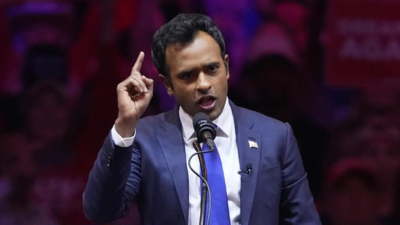
File photo: Vivek Ramaswamy (Picture credit: AP)
Indian-origin American entrepreneur and Republican leader Vivek Ramaswamy has again shared his remarks on the
US immigration system
being broken, which he claims incentivises dishonesty.
Responding to a viral TikTok podcast clip, Ramaswamy took to X (formerly Twitter) to voice his concerns.
"The #1 human attribute that our immigration system currently rewards isn’t your intelligence, willingness to work hard, or your love of America. It’s your willingness to lie to the
US government
. That must change & it will," he wrote.
The viral clip features Ramaswamy discussing the challenges within the current immigration framework. He asserted that the system unfairly rewards dishonesty, particularly in the
asylum process
.
"If you're somebody coming from another country and you can't in good conscience say you're seeking asylum under threat of imminent bodily harm due to race or religion, because it’s not true, you won’t get it. But if you’re willing to lie, you actually do. That’s the broken system we have today," Ramaswamy explained.
Ramaswamy linked these flaws to broader frustrations within the conservative movement, citing the need for reform both in legal and
illegal immigration
processes. He underscored the importance of first securing the border to address the ongoing illegal immigration crisis before tackling broader legal reforms.
A staunch supporter of Donald Trump, Ramaswamy echoed Trump’s policies, stating that
immigration reform
must start with enforcing the rule of law.
In earlier comments, Ramaswamy labelled mass deportations and the cessation of federal funding for undocumented immigrants as "pragmatic" measures, suggesting such actions would prompt "
self-deportations
" while addressing the crisis.
Ramaswamy’s remarks reflect his broader vision for immigration, which he claims aligns with American
meritocracy
and constitutional principles.
As the son of legal immigrants, he has consistently emphasised his belief in the importance of entering the US lawfully and his opposition to policies that reward those who don’t.

 2 days ago
4
2 days ago
4










 English (US) ·
English (US) ·